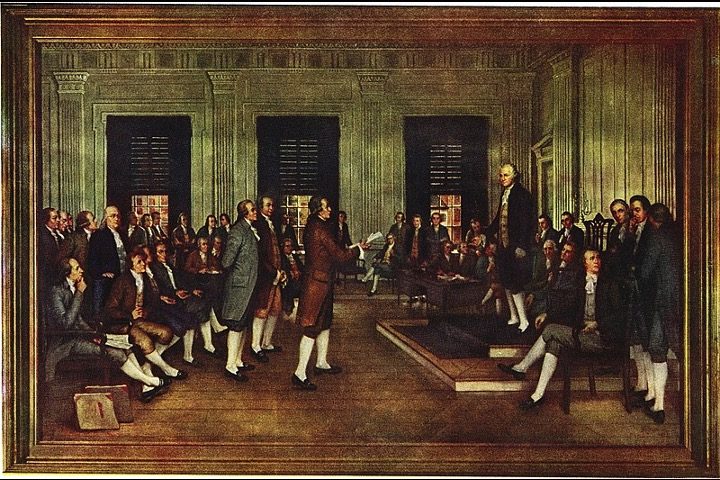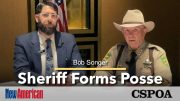
This week at the Constitutional Convention of 1787 featured speeches by a number of delegates that reveal the understanding of most of the men gathered together that summer in Philadelphia. These discourses, although never taught today — and this article will make it clear why — are worthy of study by Americans today so that we may comprehend the correct and intended relationship between the states and the federal government, and so that we may become familiar with the nature of the union of states, as it was designed by the drafters of the Constitution.
Before sharing the text of some of these addresses, it is critical that readers remember the congressional resolution that authorized the convention in Philadelphia and set the limits of the power of the delegates who would attend that august gathering.
On February 21, 1787, Congress passed the following resolution:
Resolved that in the opinion of Congress it is expedient that on the second Monday in May next a Convention of delegates who shall have been appointed by the several states be held at Philadelphia for the sole and express purpose of revising the Articles of Confederation and reporting to Congress and the several legislatures such alterations and provisions therein as shall when agreed to in Congress and confirmed by the states render the federal constitution adequate to the exigencies of Government & the preservation of the Union.
For the sake of clarity, I’ll direct your attention to a few key words in that resolution.
First, the delegates who attend the convention “shall have been appointed by the several states.” This is an important aspect of the convention that is often overlooked and rarely taught in American History classes. We, the people of the United States, did not decide the content of the Constitution. The deliberations and consequent decisions were decided by delegates representing the sovereign and independent states, not the people of the United States.
Second, these delegates were authorized to do one thing and one thing only: “revising the Articles of Confederation and reporting to Congress and the several legislatures such alterations….” Congress wanted this stricture so clear and unmistakable that it used language leaving no room for misinterpretation. The suggestion of revisions to the Articles of Confederation was the “sole and express” power possessed by the delegates at the convention.
In Samuel Johnson’s dictionary of 1786, “sole” is defined as “single, only.” In that same dictionary, “express” is defined as “a declaration made in plain terms.” When taken together, then, these words used by Congress to mark the limits of the convention’s authority meant that there was only a single and plainly declared purpose for calling on the states to send delegates to Philadelphia: propose revisions to the Articles of Confederation. That’s it. Sole and express.
That purpose, put forth in very plain terms, was to gather in Philadelphia beginning in May and to deliberate upon and then propose revisions to the — and notice what the Articles of Confederation were called — “the federal constitution.” Then, such proposals would be presented to Congress and the states for their consideration, and, if approved, those revisions would be incorporated into the Articles of Confederation.
As students of the Constitution will know, the limits placed by Congress on the authority of the convention were exceeded the first day that business was conducted, when Edmund Randolph of Virginia offered the Virginia Plan as an alternative and altogether new form of government created by an alternative and altogether new federal constitution.
Setting aside the lessons from that momentous event, it should be remembered that many of the delegates present were insistent that Randolph and the rest of the representatives present should be reminded of the limited power and narrow scope of the convention.
Furthermore, as part of that reminder, several key delegates took the opportunity to object to certain subtle though substantial alterations to the confederation of states contained in the Virginia Plan.
First to rise and speak on the subject was Oliver Ellsworth of Connecticut. As recorded by James Madison, Ellsworth rose and moved:
To alter [the Virginia Plan] so as to run “that the Government of the United States ought to consist of a supreme legislative, Executive and Judiciary.” This alteration he said would drop the word national, and retain the proper title “the United States.” He could not admit the doctrine that a breach of any of the federal articles could dissolve the whole. It would be highly dangerous not to consider the Confederation as still subsisting. He wished also the plan of the Convention to go forth as an amendment to the articles of Confederation, since under this idea the authority of the Legislatures could ratify it. If they are unwilling, the people will be so too. If the plan goes forth to the people for ratification several succeeding Conventions within the States would be unavoidable. He did not like these conventions. They were better fitted to pull down than to build up Constitutions.
Nathaniel Gorham of Massachusetts seconded Ellsworth’s motion.
As the reader will notice, Ellsworth objected to the use of the word “national” when referring to the government of the United States. Furthermore, he wanted to make sure that his colleagues understood that the “confederation” remained intact. To think or act otherwise, he added, would be “highly dangerous.”
It was that word “national” that disturbed many of the delegates. They knew from their study of history that should such a government be adopted, the confederacy of sovereign states would cease to be and that a nation would rise up in its place.
To us, “national” is synonymous with “federal,” and we don’t blink at or think anything nefarious of the word national. Many of the most respected members of the founding generation were not of that mind. They understood national to mean “consolidated,” and they understood “consolidated” to be unlimited and despotic.
William Paterson then stood and informed his colleagues that “the idea of a national government, as contradistinguished from a federal one, never entered into the mind” of any members of the state legislators who had granted the delegates their commissions to attend the convention.
John Lansing of New York added his voice to the cadre of those opposing the use of the word “national,” saying (as reported by Madison):
The true question here was, whether the Convention would adhere to or depart from the foundation of the present Confederacy; and moved instead of the 2d. Resolution, “that the powers of legislation be vested in the U. States in Congress.” He had already assigned two reasons against such an innovation as was proposed: 1. the want of competent powers in the Convention. — 2. the state of the public mind. It had been observed by [Mr. Madison] in discussing the first point, that in two states the delegates to Congress were chosen by the people. Notwithstanding the first appearance of this remark, it had in fact no weight, as the delegates, however chosen, did not represent the people merely as so many individuals, but as forming a Sovereign State.
Luther Martin of Maryland spoke next and, again as reported by James Madison, echoed and enlarged the points made by Ellsworth, Paterson, and Lansing, reciting recent history as evidence of the assertion that the people of the states did not want to become a nation and would not agree to such should it be proposed:
At the separation from the British Empire, the people of America preferred the establishment of themselves into thirteen separate sovereignties instead of incorporating themselves into one. To these they look up for the security of their lives, liberties & properties.… The federal government they formed to defend the whole against foreign nations, in case of war, and to defend the lesser states against the ambition of the larger: they [the people] are afraid of granting powers unnecessarily, lest they should defeat the original end of the Union; lest the powers should prove dangerous to the sovereignties of the particular states which the Union was meant to support.
There are at least two things to be learned from studying the motions and votes made this week at the Convention of 1787: First, Oliver Ellsworth’s motion to remove the word “national” and to consider any proposals passed by the delegates at the convention to be amendments to the Articles of Confederation was passed unanimously.
And second, the idea of a national government was anathema to the majority of the delegates there, for the simple reason that the states were “thirteen separate sovereignties,” and if a national government were formed it would “prove dangerous” to the sovereignties of the states “which the Union was meant to support.”
The word “nation” does not appear a single time in the Constitution in reference to the United States. Now you know why.



